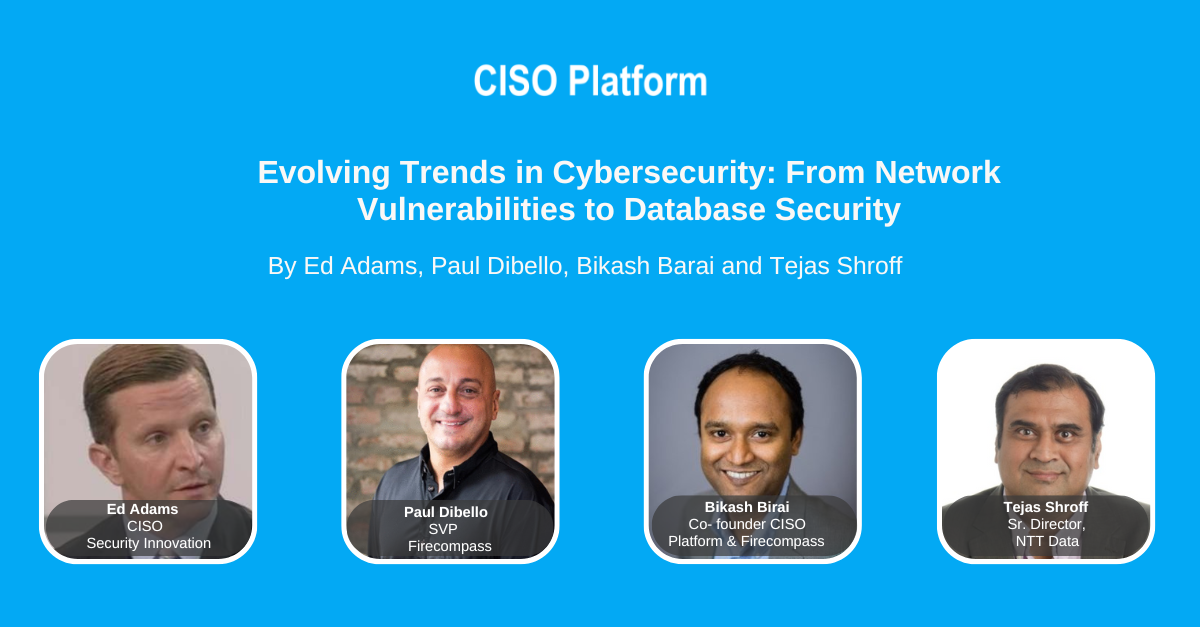
The landscape of cybersecurity has undergone significant transformations over the years, reflecting the ever-changing tactics of cybercriminals and the evolving vulnerabilities in digital infrastructure. This blog explores the shifting trends in hacking methodologies, from network-level compromises to the emergence of database security as a critical concern for organizations.
Here is the verbatim discussion:
Completeness and which also helps in the continuity may not be the depth as Ed mentioned esm is more about the bread but for depth you need to go for pentes in probably couple of decades so if I look at the way the hacking landscape has kind of changed over a period of time so it went through a lot of interesting phases so there were times when the hacking used to happen more through compromise of uh the network level vulnerabilities then came a phase where application Level vulnerabilities took over and then a little bit later something very strange happened when the industry went through like two decades of vulnerability assessment penetration testing and all this super cool stuff we started seeing some strange stuff happening in last few years and I'll give you an example one of the strange stu stuff is like one of the topmost names in the financial services companies got compromised because they had a open database without any password.
Highlights :
Historical Phases of Hacking:
- Network-Level Vulnerabilities: In the early stages of hacking, compromises often occurred through exploiting vulnerabilities in network infrastructure, such as unsecured ports or misconfigured firewalls.
- Rise of Application-Level Vulnerabilities: With the proliferation of web applications, hackers shifted their focus to exploiting vulnerabilities in software and web applications, such as SQL injection or cross-site scripting (XSS) attacks.
- Decades of Vulnerability Assessment and Penetration Testing: The cybersecurity industry witnessed a surge in vulnerability assessment and penetration testing, aimed at identifying and remedying security weaknesses in digital systems.
Emerging Trends in Cyber Attacks:
- Database Security: In recent years, the spotlight has shifted towards database security, with incidents of data breaches occurring due to misconfigured or unprotected databases. For example, prominent financial services companies have faced security breaches due to open databases without passwords, highlighting the importance of securing sensitive data at the database level.
- Importance of Depth in Security Measures: While external attack surface management (EASM) provides breadth in identifying digital assets and potential vulnerabilities, depth in security measures is essential to address specific threats, such as database security lapses.
The Need for Comprehensive Security Practices:
- Continuous Assessment and Monitoring: Organizations must adopt a proactive approach to cybersecurity, conducting continuous assessments and monitoring to identify and address vulnerabilities promptly.
- Collaboration with Cybersecurity Experts: Cybersecurity consultants play a crucial role in guiding organizations in implementing comprehensive security practices, including database security measures and vulnerability remediation strategies.
As cyber threats continue to evolve, organizations must adapt their security practices to address emerging vulnerabilities effectively. From network-level compromises to database security lapses, the cybersecurity landscape demands a comprehensive approach to threat mitigation and risk management. By staying vigilant, collaborating with cybersecurity experts, and implementing robust security measures, organizations can enhance their resilience against cyber threats and safeguard their valuable data assets.
Speakers:
Bikash Barai is credited for several innovations in the domain of Network Security and Anti-Spam Technologies and has multiple patents in USPTO. Fortune recognized Bikash among India’s Top 40 Business Leaders under the age of 40 (Fortune 40-under-40).Bikash is also an active speaker and has spoken at various forums like TiE, RSA Conference USA, TEDx etc.Earlier he founded iViZ an IDG Ventures-backed company that was later acquired by Cigital and now Synopsys. iViZ was the first company in the world to take Ethical Hacking (or Penetration Testing) to
the cloud.
https://twitter.com/bikashbarai1
https://www.linkedin.com/in/bikashbarai/
Ed Adams, a seasoned software quality and security expert with over two decades of industry experience. As CEO of Security Innovation and a Ponemon Institute Research Fellow, Ed is renowned for his contributions to advancing cybersecurity practices. With a diverse background spanning from engineering for the US Army to senior management positions in leading tech companies, Ed brings a wealth of expertise to the table.
https://www.linkedin.com/in/edadamsboston
Paul Dibello, based in Duxbury, MA, US, is currently a Senior Vice President Global Business Development at ShadowDragon, bringing experience from previous roles at FireCompass, R9B, Virtru Corporation and iSIGHT Partners - A FireEye Company. Paul DiBello holds a 1986 - 1990 Bachelor of Arts (BA) in Economics @ Princeton University. With a robust skill set that includes Software, Sales, Project Management, Development, Operations and more, Paul DiBello contributes valuable insights to the industry.
https://www.linkedin.com/in/pauldibello11
Tejas Shroff based in Boston, MA, US, is currently a Software Engineer at Tangle, bringing experience from previous roles at Aperion Studios, XPO Logistics, Inc., Oculus VR and Beach Day Studios. Tejas Shroff holds a 2019 - 2019 UX Design Immersive in Design & User Experience @ General Assembly. With a robust skill set that includes Leadership, Social Networking, Start Ups, Social Media, Teamwork and more, Tejas Shroff contributes valuable insights to the industry.

Comments